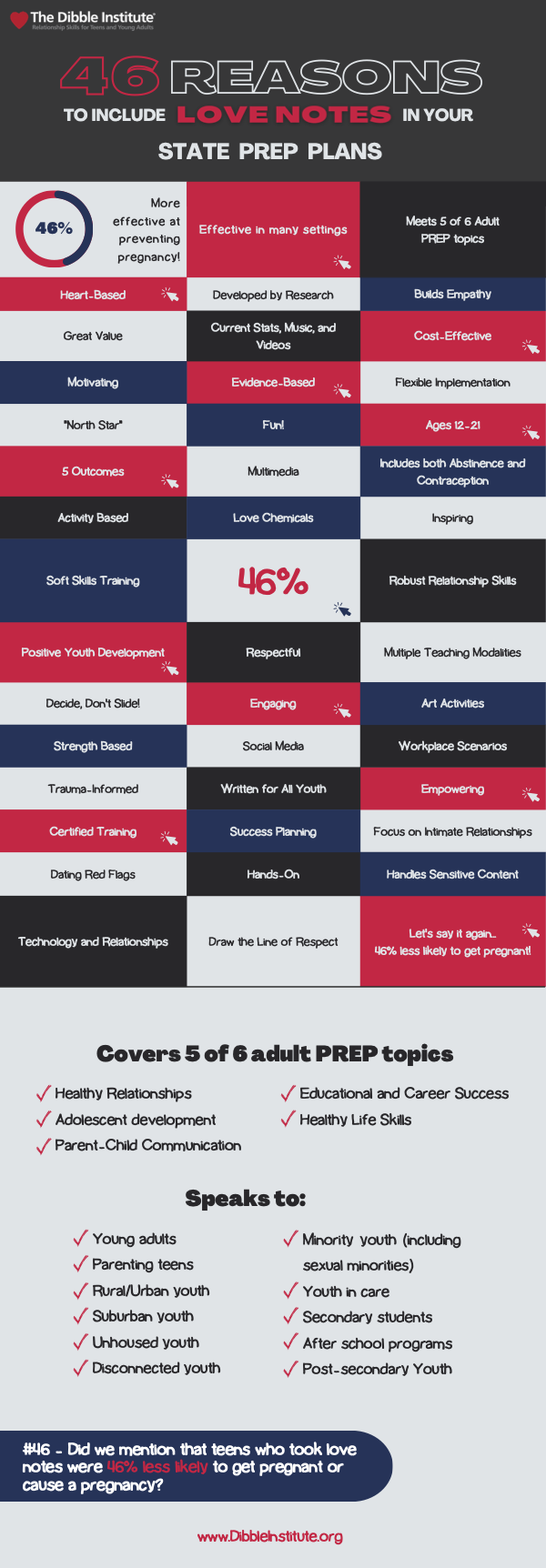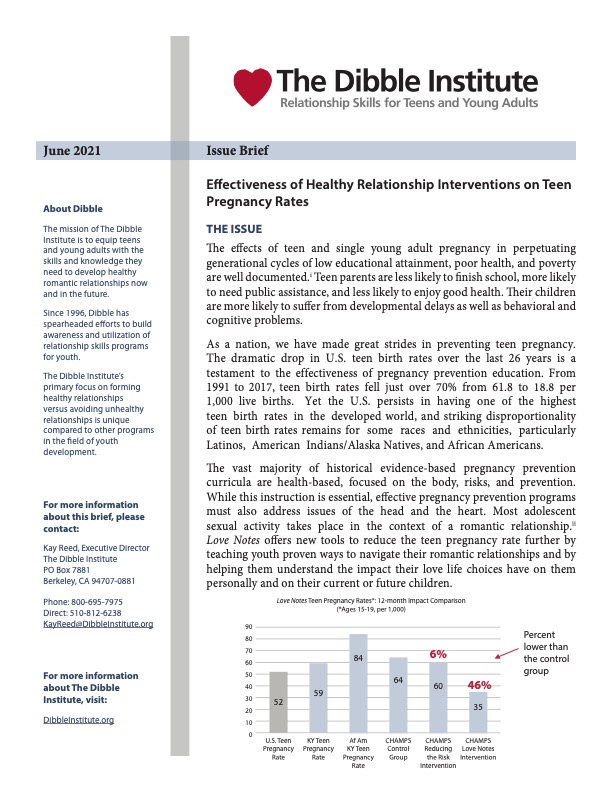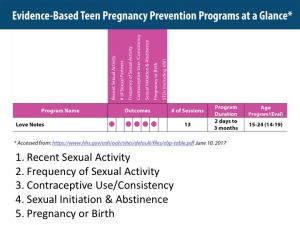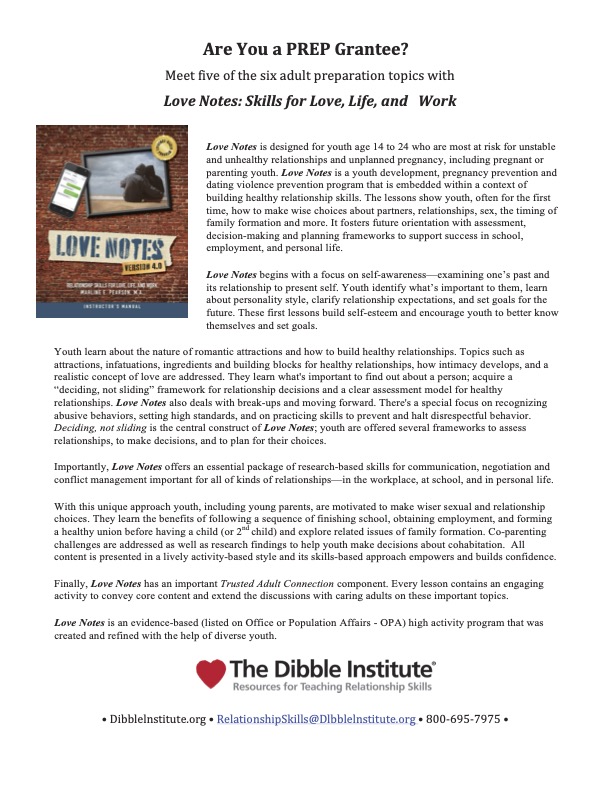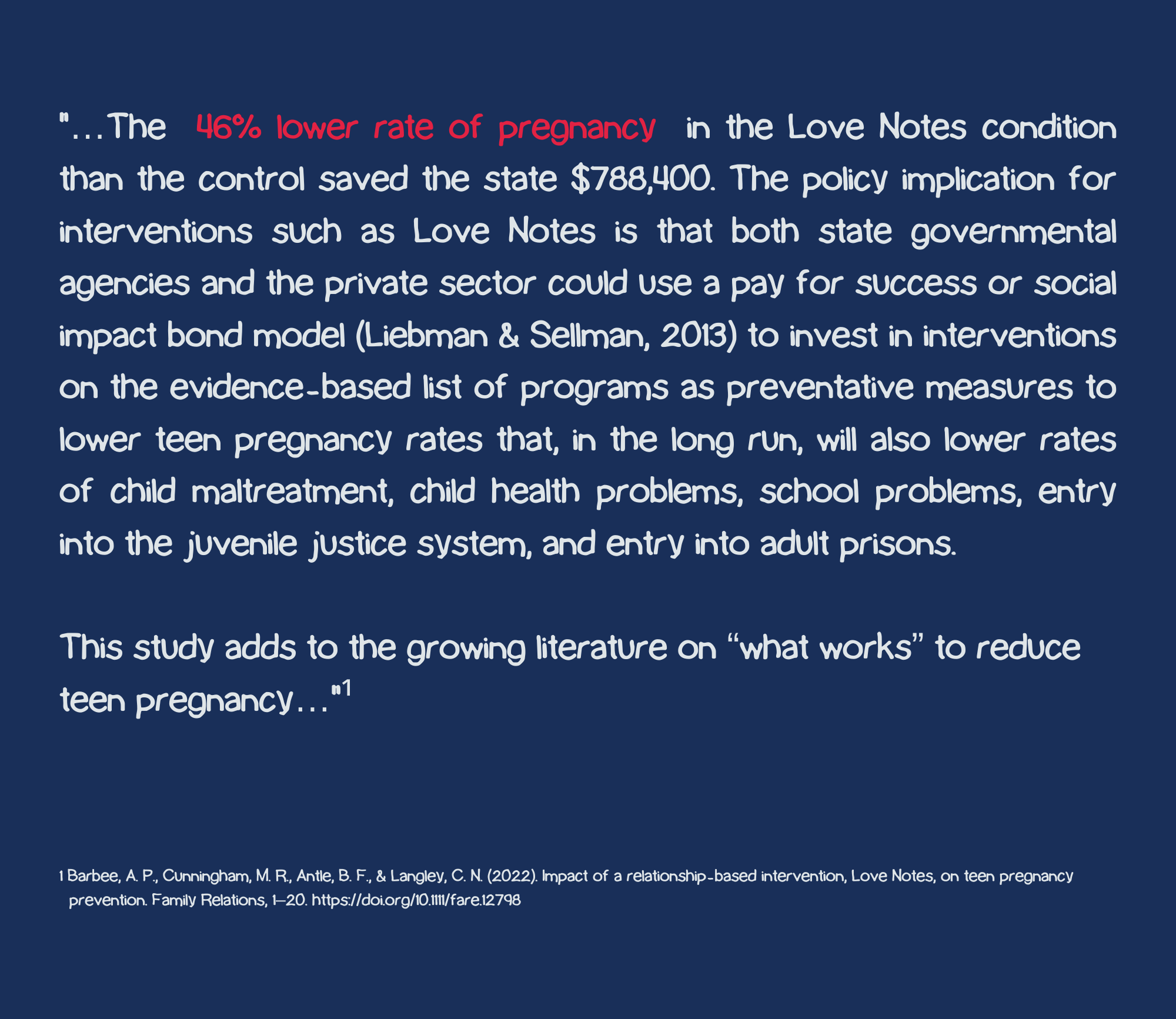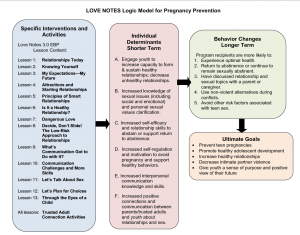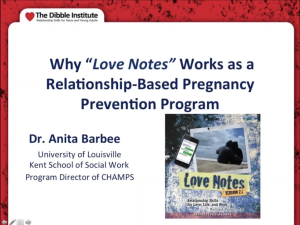Are you looking for an innovative, effective, and engaging EBP to add to your state’s list of approved PREP programs?
Take a look at Love Notes 4.0!
- Love Notes 4.0 is the ONLY program on the federal OPA list with five positive outcomes and no negative outcomes.
- Compared to the control group, Love Notes students were 46% less likely to become pregnant at one year post-instruction.
- Love Notes 4.0 easily covers five of the six adult preparation topics.
Love Notes 4.0, updated in 2022, includes brand new and updated content important to today’s youth, including sex trafficking prevention, technology in relationships, navigating relationships in the digital age, online porn, sexual assault, consent—and their impact on relationships. Love Notes 4.0 includes the evidence-based content with supplemental materials that allow facilitators to go deeper on topics that are meaningful to young people. Love Notes 4.0 student materials are also available in Spanish!
For more details on Love Notes, please dive into the information below! If you need further information, please reach out to Jonelle Zachary, Outreach Coordinator.
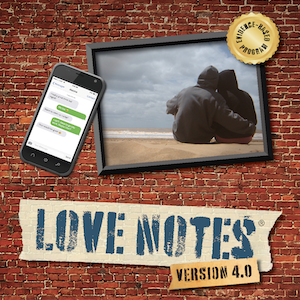
Love Notes is being successfully implemented with diverse types of youth in a wide variety of settings across the US and US Territories. Here is a partial list of populations and settings where Love Notes is being used.
Check out our Case Studies here.
Populations
- Risk-immersed youth
- Expecting and parenting teens (both fathers and mothers)
- GLBTQ+ youth
- Youth in correctional settings
- Tribal youth
- Runaway and homeless youth
- Community college students
- Foster youth (both within the system and aging out)
- Abused young people
Settings
- Workforce Development (YouthBuild/Job Corps)
- Group homes (Foster)
- Residential settings (Mental health)
- Detention centers
- Challenge academies Schools
- Alternative schools
- Faith-based settings
- Community agencies
- Community colleges
- In-home visitation
- Domestic violence shelters
Click here for a pdf file of the Love Notes Theory of Change
Love Notes – Theory of Change
A. Intentionality via the Theory of Planned Behavior. The theory of planned behavior was used to develop Love Notes. A guiding principle behind the theory of planned behavior is that increasing the likelihood of forming a behavioral intention can, in turn, lead to behavioral change. There is a strong relationship between behavioral intentions and actual behaviors.
In accordance with the core constructs of this theory, Love Notes seeks to impact the following three aspects of an individual in order to increase the likelihood of that individual forming a behavioral intention:
- Knowledge and beliefs that shape attitudes about the likely consequences of risky sexual behaviors and unhealthy relationships. This is provided by lectures, video clips, and group exercises that provide information on the reproductive system, contraception, and pregnancy,
- Perceptions one has about the normative expectations of others around her/him regarding risky sexual behaviors and unhealthy relationships. This is provided through lectures, video clips, and group exercises that increase the youths’ knowledge of the thoughts, opinions, and actions of other youth, and
- An increase in one’s confidence in his/her ability to perform a particular behavior (perceived behavioral control/self-efficacy, i.e. I can do it). This is provided through lectures, video clips, and group exercises that are intended to increase the youths’ enthusiasm, agency, and self-efficacy
Thus, a youth’s maladaptive beliefs and attitudes about relationships and the consequences of risky sexual behaviors can be changed if exposed to an intervention that offers new information that helps the individual alter their perception of social norms and optimal behavior in relationships. This information needs to be bolstered with plenty of real and believable scenarios as well as culturally relevant examples from multiple kinds of presentations—visual, audio, oral, and kinesthetic. Offering skills for protective sexual health behaviors and healthy relationship formation and maintenance, along with clear frameworks to make decisions and specify intentions, should strengthen behavioral intentions as well as the confidence to change actual behaviors (self-efficacy).
B. Success Sequence via Cognitive-Behavioral Theory. In Love Notes, a cognitive behavioral approach is added to the Theory of Planned Behavior. Cognitive behavioral theory is the idea that the way we think about situations can affect the way we feel and behave. In particular, negative thinking patterns start early in life. So, if an intervention can help a participant identify and challenge negative thinking patterns and behaviors, it can potentially change the way that person feels about situations and enables them to change their behavior. The intervention may help participants look at what is going on now in their life as well as look at their past and think about how their past experiences impact the way he or she sees the world and in turn help participants clarify behavioral intentions and future behaviors. One important framing component in Love Notes is the success sequence, which allows youth to concretely plan so as to maximize their ability to reach life goals for self-sufficiency and connection.
C. Compassion via Empathy Model of Altruism. A conceptual framework developed by the author, dubbed Through the Eyes of a Child, strengthens and reinforces pregnancy prevention efforts using a unique approach in motivating young people to avoid an unplanned pregnancy. Rather than only focus on a youth’s self-interest, it also includes a focus on a child the youth may have now (as a part of secondary pregnancy prevention programs) or in the future (as a part of primary pregnancy prevention programs). Young people are invited to deeply consider what an unplanned pregnancy means and feels like to a child. This is consistent with Daniel Batson’s Empathy Model of Altruism. Through a series of activities, youth explore the consequences of unplanned pregnancy within unstable and/or troubled parental relationships from the perspective of a child. Some participants may remember their own childhoods of instability and not want to repeat that. This shifting of the center of consideration to that of a child versus one’s selfinterest sparks compassion and increases motivation to take the actions necessary to avoid unplanned pregnancy.
D. Intentionality via Planning. As Kathryn Edin, Ph.D. found in her work, Promises I Can Keep: Why Poor Women Put Motherhood Before Marriage and more recently Doing the Best I Can: Fatherhood in the Inner City, while all young people want a good life for their child, there is a lack of understanding about the connection between their child’s welfare and their parents’ love choices and love lives. As participants come to understand the other stakeholders (their children) in their relationship and sexual choices, there is an increase in motivation. This approach also reinforces the importance of Intentionality. That is expressed in terms of planning and not drifting, a term used by Isabel Sawhill, President of the National Campaign to Prevent Teen and Unplanned Pregnancy and author of Generation Unbound, as well as Scott Stanley’s sliding vs. deciding concept, both of which are used in Love Notes. Within this framework, youth address issues of father absence and father involvement, co-parenting whether together or apart, and early childhood development needs.
E. Avoidance of Coercive Relationships via Michael Johnson’s Multidimensional Model on Intimate Partner Violence. Relationship aggression is common. For those 18 years of age and over, according to the Centers for Disease Control and Prevention, nearly one in three women (29%) and one in 10 men in the U.S. have experienced rape, physical violence and/or stalking by a partner, and report a related impact on their functioning.2 The 2013 Youth Risk Behavior Survey (CDC) found that among the 74% of high school students who dated or went out with someone in the past 12 months, 10.3% reported physical dating violence.3
The literature on intimate partner violence (IPV) makes distinctions between types of relationship aggression. Michael Johnson, a leading researcher in the field, as well as others, makes a distinction between coercive control violence (also known as intimate terrorism) and situational couple violence. 4 Coercive control violence or intimate terrorism refers to couples in which there is a clear batterer who threatens, controls, and holds power over a partner who is a victim. The central motivation is control of the partner. This kind of aggression escalates over time and is more likely to include serious injury or homicide than situational violence. Situational couple violence is more common (Johnson & Leone 2005) and especially so for youthful populations. In this type of relationship aggression, both partners typically engage in physical aggression that stems from poor impulse control and conflict resolution skills rather than from the more pathological, controlling personality traits.
Although females typically suffer more severe consequences than males, females also perpetrate aggression within intimate relationships in this type of intimate partner violence. In Love Notes, situational couple violence is referred to as “arguments-that-get-physical.” Warning signs of unhealthy and violent relationships, including those that are terroristic in nature is included in the curriculum as well. There is an emphasis on the fact that any form of aggression is unacceptable, since abuse is associated with physical and emotional harm. Both types of violence are clearly important to explain.
The benefit of presenting the Johnson model of both coercive control violence/intimate terrorism and situational couple violence is that it makes the content on relationship aggression applicable to a wider audience. Too often, interventions and prevention programs focus on coercive control violence/intimate terrorism as defining all or most relationship aggression. If the intervention discussed aggression only in the context of one partner being a controlling batterer and the other a victim, participants who experience situational couple violence or who sometimes act aggressively themselves might feel the information was not relevant to them or based on common reality. They may conclude the discussion doesn’t apply to them, yet for most youth involve in intimate partner violence it does.
By presenting both types and the range of associated behaviors, participants can better understand that no aggression is acceptable. Both are clearly important to prevent and exit out of safely because any form of aggression is unacceptable and can be associated with serious harm and negative outcomes.
Love Notes educates youth on how coercive control violence can start and progress from the very first signs of disrespect, the impact it can have on a victim, the signs of greatest danger, and how/where to get help, as well as safety planning and leaving in ways that minimize risk of harm. It also educates on situational couple violence—from the early warning signs, to the harm and negative outcomes, to where/how to access additional help and resources. Love Notes teaches youth ways to de-escalate arguments, regulate emotions, take time-outs and builds skills for talking through difficult or conflict-laden issues safely so as to collaboratively problem solve and reach mutually beneficial resolutions. Participants learn and practice a set of evidence-based communication and conflict management skills. Love Notes also explores the kinds of harm to children from both types of relationship aggression. A central message is to draw the line of respect at the first sign of disrespect.
1 (Kathryn Edin was a consultant with Pearson’s co-authors Scott Stanley and Galena Kline Rhoades on Within My Reach.)
2 Centers for Disease Control, Understanding Intimate Partner Violence, Fact Sheet 2014. Retrieved: http://www.cdc.gov/violenceprevention/odf/ipv-factsheet.pdf
3 Youth Risk Behavior Survey summary 2013: http://www.cdc.gov/mmwr/preview/mmwrhtml/ss6304a1.htm?s_cid=ss6304a1_w
4 Hardesty, J. L., Crossman, K. A., Haselschwerdt, M. L., Raffaelli, M., Ogolsky, B. G., Johnson, M. P. (2015). Toward a standard approach to operationalizing coercive control and classifying violence types. Journal of Marriage and Family. doi: 10.1111/jomf.12201
Love Notes fidelity tools for great results!
The following fidelity aids and checklists are included when you purchase the Love Notes 4.0 Manual:
- Annotated slide deck to focus the instructor on key content.
- Fidelity monitoring tools for facilitators, observers, and evaluators.
- Love Notes knowledge test.
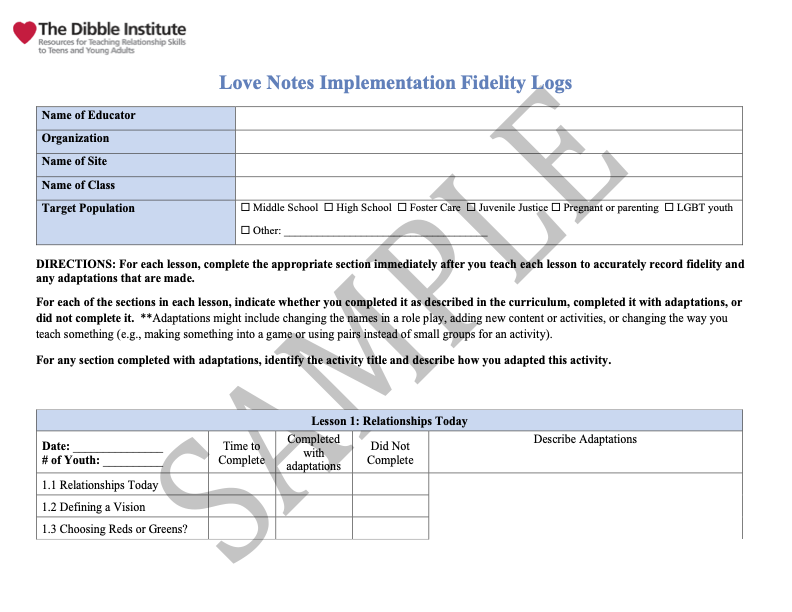
We have all Love Notes 4.0 student materials available in Spanish and in fillable PDFs!
For complete fidelity in presenting Love Notes 4.0, please plan to purchase the Instructor’s Kit, Participant Journals, and COLORS Personality Sorters.
To purchase Love Notes 4.0, see our product options by visiting our online store.
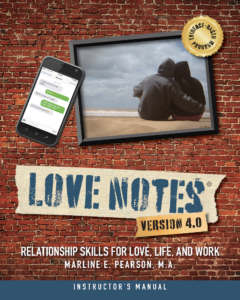
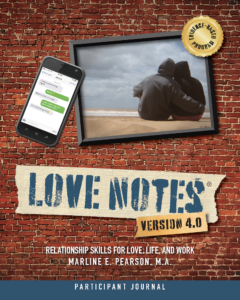
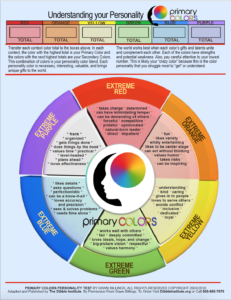
Art Supply List*
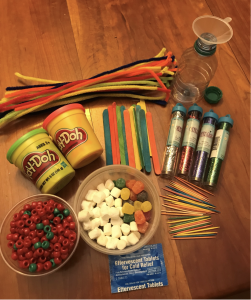
- 1 Pad of Flipchart paper with adhesive backing (Post-it) plus easel if no whiteboard. Water based markers
- 1 Box or bag of wooden craft sticks, colored if possible – popsicle size
- 2 Six packs of Playdough (large size – not mini)
- 1 Bag of jelly spice drops, Dots, or something toothpicks can pierce
- 1 Bag of mini-marshmallows
- 1 Box of strong wooden toothpicks with pointed ends
- 1-2 Packages of colorful craft pipe-cleaners
- 2 Small package of plastic GREEN and RED craft beads (1 of each color)
- 2 Small clear 9 oz. plastic beverage cups
- 1 Bottle of soda (12 oz.—not a big one)
*Craft Items are sold separately and can be purchased at a Joanne’s, Michael’s or other craft store.
Bulk Discount available for Print Materials. For additional pricing information or to share your specific needs, please contact Samantha Bartholomew, our Client Services Coordinator, at Hannah @ DibbleInstitute.org
For Training options of these programs, click here.
Training Of Educators (TOE)
A training of educators means that someone who completes training and becomes certified can implement the program with youth and young adult participants.
Our training of educators can be completed virtually or in-person. Virtual trainings consist of five consecutive days (M-F) for 3.5 hours each day whereas in-person trainings consist of three full consecutive training days.
Upon completion of a TOE, participants will be able to:
- Explain the philosophy and research base of the program.
- Confidently implement the curriculum in a way that creates positive student outcomes.
- Facilitate lessons and activities to best meet your students’ needs
Training of Trainers (TOT)
A training of trainers means someone who successfully completes the training becomes a Certified Dibble Trainer and is capable of training their organization’s facilitators in the Love Notes curriculum. In order to be considered for this training, individuals must have attended a Dibble-certified training and have direct experience implementing the program.
Technical Assistance (TA)
The Dibble Institute has successfully provided relationship skills education in a variety of venues with diverse populations for years. We have managed large federal grants and we have sat on federal grant review panels. We are happy to share our expertise so you can be successful as well!
TA topics may include but are not limited to:
- Training (e.g., facilitation skills, teaching strategies, trauma-informed delivery)
- Content (e.g., tracking fidelity, adaptations)
- Grant success (e.g., formulating an implementation plan, preparing for your evaluation, recruiting partners)
For more information about our training options, to schedule your training, or to obtain a training quote please call our training line at 800-695-7975 Ext. 200 or you can email Dr. Rachel Savasuk-Luxton, our Director of Research and Training, at Rachel @ DibbleInstitute.org
To see material costs, click here.
Other Resources:
WEBINAR: Introducing At-Risk Youth to Relationship Skills for Love Life, and Work Marline E. Pearson, M.A.
Reports:
Evaluation of Love Notes and Reducing the Risk in Louisville, KY
Cunningham M. R., van Zyl, M. A., & Borders, K. W. (2016). Evaluation of Love Notes and Reducing the Risk in Louisville, Kentucky. Final Evaluation Report to the University of Louisville Research Foundation, Louisville, KY.
Interview with Primary Investigator, Anita P. Barbee, MSSW, Ph.D.
Professor and Distinguished University Scholar
President-Elect, International Association for Relationship Research
Kent School of Social Work
University of Louisville
On March 27, we held a special 45-minute webinar for State PREP Directors and their program managers for why Love Notes 4.0 should be a part of your State PREP plans. In this webinar we review the efficacy, updates, design and testimonials of Love Notes 4.0.
Click the videos below to review the 9 key moments within this webinar.
History
Efficacy
Adult PREP Topics
Program Design
Updated Content
Testimonials
Program Flexibility
Training
Contact Information
Watch the FULL Webinar below:

Resources:


